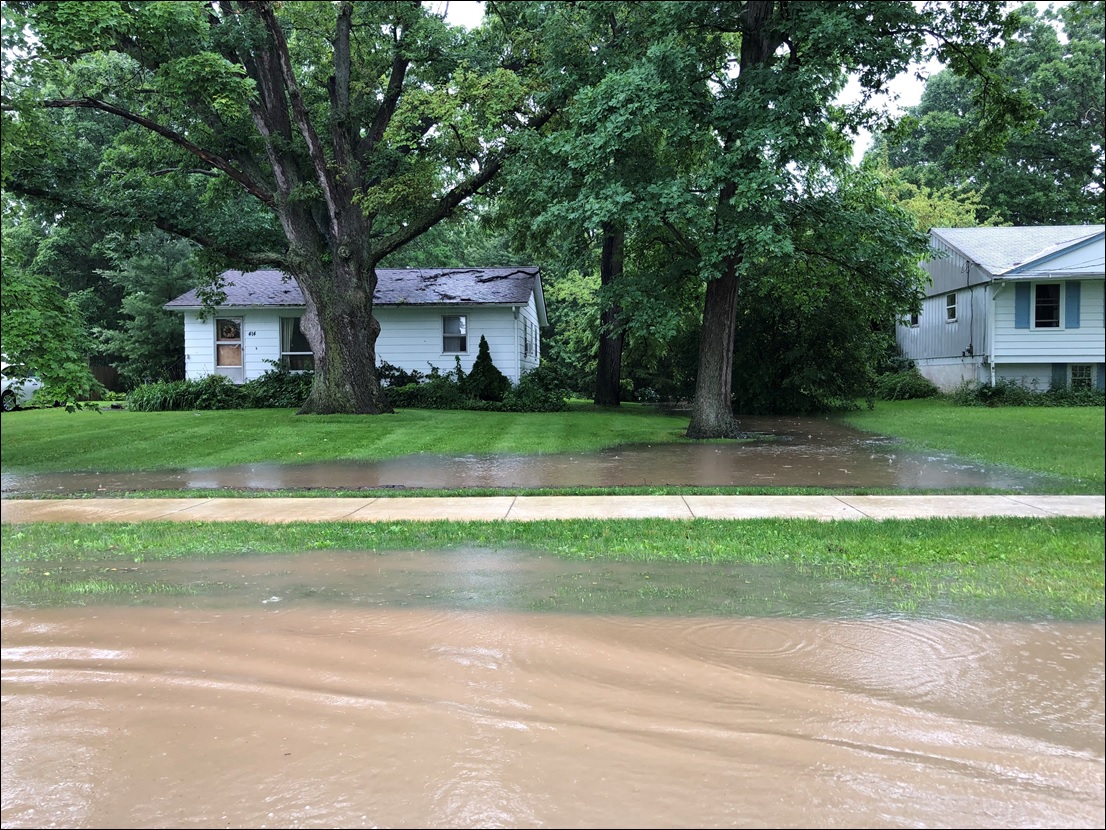Quantifying the impact (social, economic and environmental) of stormwater in the City of Oberlin and designing a sustainable solution to address it.
Oberlin, Ohio, United States,

Photo courtesy of Jennifer Reeves
The project aims to solve the problem of stormwater in the City of Oberlin.
To achieve this, we first need to have a clear understanding of the impact of stormwater on the City. We would like to collect data to describe the scale of the problem in terms of the three dimensions of sustainability (social, environmental and economic). The data of interest include public interviews, records reviews, and field observations. These data will then be presented into graphs, graphics and infomatics to the decision makers in the City.
By solving the stormwater problem using a sustainable approach, we will improve the quality of life of residents and ensure sustainable stormwater management.
Thanks to this project, residents will be able to get rid of the accumulation of stormwater in their yards and the associated nuisance.
Results
The TEX team did start by identifying our target audience. The Lorain County Auditor’s property records were reviewed to identify property owners along the Plum Creek as well as tributary waterways that drain into the Plum Creek. Property owners that lived along streets where the street itself comprised the storm sewer infrastructure (as in, the street itself drained stormwater along a slope towards catch basins and underground piped sewer systems) were also included as part of the target audience to better understand what their lived experience was like.
A survey personalized to the residents of Oberlin was then developed. Questions to help the TEX team understand a resident’s proximity to the nearest waterway, what frequency and depth of ponding water they experienced, as well as opinions on various types of Green Infrastructure that could resolve ponding water issues were developed. This two page survey (one sheet, double sided) was printed and mailed directly to each of the identified properties. A QR code was included on the survey to direct people to an online version of the survey, if a digital response were preferred by the recipient. The target audience was given a month to respond to the survey in whatever format they preferred.
As survey results came in, they were tracked in an Excel spreadsheet. No statistics were run on the information, but charts and graphs were created to give a visual representation of the data gathered. A surprising result was the lack of general information the participants appeared to have regarding Green Infrastructure practices. This information influenced the media campaign that was then developed.
A series of public outreach slides were developed and distributed through the City of Oberlin’s social media accounts. These slides focused on describing common, but unfamiliar to the participants, ways of managing stormwater on one’s property. These slides were distributed over the course of a month at the rate of one per week, to keep people engaged and not overwhelmed with information. Jennifer Reeves, the community contact, also developed and gave a presentation of the survey data and public outreach media campaign on April 19, 2024. This was an advertised and open opportunity for anyone within the community to learn more about the survey process, the data collected, and the what options exist now as well as are being developed for the future, within the City of Oberlin.
In addition to this general outreach, as people turned in their surveys, many participants also chose to reach out to Jennifer directly to discuss their concerns and issues on their properties. Jennifer worked with each participant that reached out to better understand their concerns at hand, and to help the participants develop a personalized plan for managing stormwater on their property. This work will continue through the summer, with continued public outreach at the City of Oberlin’s farmers market, and other community events, to keep sharing information on residential options for stormwater management.
One of the hoped for goals for this project would have been developing a Green Infrastructure design to implement within the City of Oberlin. While the survey process and outreach information was of use to the City of Oberlin’s Public Works Department, the Public Works Department was working on its own timeline to develop a Stormwater Strategic Plan for the City. This Strategic Plan is to be used to identify priority areas within the City of Oberlin so that stormwater management could be developed for these specific areas. It did not make sense to put in the time and effort of designing GI for an area identified by the survey process if the TEX team was not sure that the City’s Strategic Plan would also support that design. Given that the Strategic Plan was progressing on a much longer timeline than the TEX project was working on, this portion of the project was not worked on at this time.
After the planned outreach portion of the project was completed, an organization called My Rain Plan unexpectedly reached out to see if they could be of assistance to the project. My Rain Plan is an online start-up company that is enthusiastic about making Green Infrastructure solutions more easily available to home owners. Whether or not a future partnership will continue is not guaranteed, but having them enthusiastically reach out was really nice and supportive.
Here are links to the online media outreach:
https://www.facebook.com/photo.php?fbid=743022368017707&set=pb.100069298506056.-2207520000&type=3
https://www.facebook.com/photo.php?fbid=747147457605198&set=pb.100069298506056.-2207520000&type=3
https://www.facebook.com/photo.php?fbid=751274067192537&set=pb.100069298506056.-2207520000&type=3
https://www.facebook.com/photo.php?fbid=755433203443290&set=pb.100069298506056.-2207520000&type=3
Reflections
The first thing I think has contributed to our success is discipline. We stuck to the meetings we agreed at the beginning and that helped us stay on track. The second is team spirit. We tried our best to be respectful to each other and give constructive feedback to move the project forward. The third thing that helped us was to focus solely on achieving our project goal, rather than being distracted by anything else.
The lesson I learned from this experience is the power of teamwork and the importance of good communication to make a project successful.
Description
About the Community
Oberlin is a community of 8-9,000 people, plus a college that can add around 3,000 more people to the community when it is in session.
The community has progressive environmental and social ideals, and seeks to improve the quality of life for all residents through environmentally friendly means. There are native tree planting programs and the city’s stormwater coordinator, our community lead, has been working to increase stormwater awareness since she took office in 2019.
The city government is making the ongoing Stormwater Master Plan public. People have had a lot of very interesting questions and misunderstandings about how the city can manage stormwater within its borders. (Link to the section of the City website related to stormwater management).
About the Project
The community would like to quantify the impact of stormwater and engage with a scientist specializing in green infrastructure and low impact design (GI/LID), so that they can design a variety of potential solutions to stormwater issues that can then be worked on by the stakeholders that will result in sustainable stormwater management.
The stakeholders are primarily the stormwater coordinator and residents.
Residents often complain about problems such as the build-up of water in someone’s yard. While there may be health issues related to standing water or mosquitoes, most complaints are due to people not being able to mow their lawn. Residents will benefit from solutions that help them manage this water in their yards, rather than building elaborate and expensive underground pipe systems that would simply move the water elsewhere and create the same issue to manage elsewhere.
To advance the priority described above, the project intends to conduct a comprehensive survey and interview community members about their views on stormwater and their ideal outcomes regarding how to manage the effects of stormwater on individual properties and property owners. The information gathered in this survey can then be used to develop informational materials as part of a public education campaign. It can also be presented to decision makers within the City to help guide them in their Stormwater Master Planning.
This project will produce clear graphs, graphics, and reports describing the scale of the stormwater problem in the City and sustainable approaches to tackling it.
The City of Oberlin and other communities will acquire the techniques they need to manage stormwater sustainably.
Timeline and Milestones
The expected duration of the project is approximately 12 months.
Project Team
Community Lead
Jennifer Reeves, Stormwater Coordinator, City of Oberlin
After working in the private sector as an Environmental Scientist for almost a decade, Jennifer Reeves brought their experience in water management and compliance to the City of Oberlin when the City created a Stormwater Coordinator position to officially manage its stormwater services. Jennifer has been working to reincorporate historically existing ecosystem services back into their community to address stormwater runoff and related concerns. They are also working to make the idea of building a better living relationship with one’s environment, rather than relying on heavily engineered mechanical solutions, more commonly embraced by the general population.
Community Scientist

Patrick Marchman, Principal, KM Sustainability
Patrick is an award-winning program manager, planner, and strategic advisor, with 20 years of experience in environment, climate, and disaster risk reduction/hazard mitigation. He has also worked for the private and non-profit sectors and has helped build several organizations. He is an AICP-certified planner and have a long record of publications and contributions to the field.
Community Science Fellow

Audrey Maatchi, founder & CEO, AudGreen Consulting
Because she dreams of cities in Cameroon, Ethiopia, Burkina Faso, etc. shining with the light of sustainability, Audrey founded AudGreen Consulting, a company that helps companies and organizations to perform better by adopting sustainability in their strategy and day-to-day operations. She is convinced that by raising environmental awareness in the workplace, many people will become involved as ambassadors for sustainable living in their families and communities, because we all need to act together to make sustainable development a reality.
Status:
Complete,
Location:
Oberlin,
Ohio,
United States,
Managing Organizations:
No organizations
Project Categories:
Flooding,
Project Tags:
No tags
